
By: Melody Rabor-Dizon
By the end of the 3rd day of my hospitalization from Covid, I was so ready to go home. I felt life was infused to me after my first dose of Remdesivir. Huffing and puffing while walking and not finishing sentences, this stuff is real. Out of all of us in our household, I had the worst one. Ranging from chills, muscle aches and sore throat, my kids and spouse breezed through Corona like it was an ordinary flu. Good for them. But not to me. Coughing was my major symptom and when my oxygen saturation was dropping 88%, I told my husband to pls bring me to ER. And the very first question the ER physician asked me ….. Why did you wait so long? That’s a million dollar question coming from a nurse. I thought it out and defended myself. I had everything I need at home. What can ER do to me that I cannot home? Sans the low oxygenation level, I have my oxygen saturation apparatus, nebulizer and meds. Steroid was called in by my physician, hoping I could wade it out. But double Covid pneumonia wiped my slate. It did not matter. Though, I may only be on hypertensive medication for hypertension, considered as a pre-existing condition, whenever airway is involved all else fails.
But God in His goodness, healed me and my family. I am very grateful for life. As sure as I was how this pandemic has rocked me from my core, mental health couldn’t be emphasized any further. It’s hurting a lot of people. I, for one. So how do we survive the mental health of COVID that puts a heavy toll on us:
From health.com, experts suggested these steps. Remember: You’re not alone in feeling this way.
1. Answer any what-ifs
What if I lose my job? What if I get sick? What if a loved one gets sick? It can feel impossible not to think about these hypotheticals, given the scale of the pandemic. Answering your questions can help you establish plans you never thought you needed. If you know exactly who you’d call and exactly where you’d go if you did get very sick, this might help you feel less nervous about the hypothetical scenario.
2. Differentiate the workday from the rest of the day
Though, I may have gotten used to in wearing sweatpants or yoga pants every day and not having to bother with business casual to work from your couch, there are days I still want to dress up and put make up on. Dressing the way we used to might help restore a sense of normalcy to this un- normal time. Experts say, adding this can enhance structure by helping you differentiate the workday from everything else you’re doing at home during quarantine
Another tip: End the workday with a “virtual commute” by clearing your head for a few minutes after you’ve sent your last email of the day, the way you would on your walk, drive, or bus ride home from work each day.
3. Monitor how much time you spend on the news
“This is how the news works, giving us the hard and fast truth,” experts says. That truth during the COVID-19 pandemic, with death tolls going up daily and millions suffering financially, can instill fear, anxiety and apprehension. News tend to do that and more, it may be our reality for now, but we also cannot be on a constant watch of the news either. Detaching oneself by setting a time each day and allotting time to catch up on the news so when the time is up, you shut it off. This can also be called boundaries.
4. Focus on what you can control
Focusing on things that we have control over is much more freeing than controlling over what we cannot. It’s all about the mindset. So what are those things that we have control of : wearing mask, wash hands, social distancing or staying home are examples.
5. Stay present
This time last year, I was doing this and I was here – this is not going to help nobody.” Stop comparing, [and] keep moving forward,” per experts.
6. Look for good news
Look for the silver linings . I bet you can find one and this will look differently for everybody: For some, this is really hard to do. Out of the many patients I see and reviewed hundreds of records, medications for anxiety, depression has never hit this high since the pandemic. There is always help if you need one.
7. Be patient with yourself
Be patient and kind to yourselves as much as possible. Try not to be too hard on yourself when you don’t finish everything on your to-do list or simply don’t feel like tuning into that zoom happy hour. Don’t underestimate resting, exercising, and eating nutritious foods -getting enough movement, adequate sleep, and eating foods that give you energy will keep both your mental and physical self as healthy as possible.
Vaccinate.
GUYS, this too shall pass. My mom tells me that all the time. Nothing lasts forever. Keep that in mind. Love you, all.
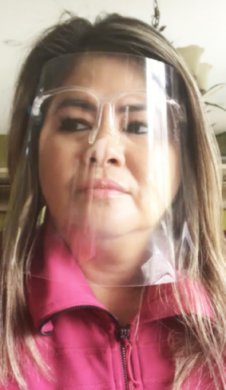
Faceshielding – when talking 6 feet away to hearing impaired patients
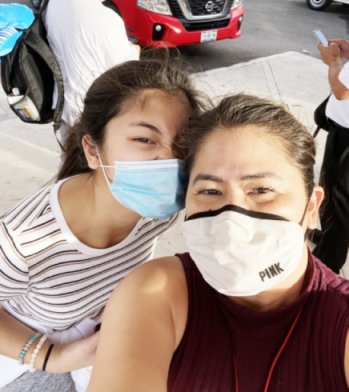
Even when outside…masking with Ashley Dizon (daughter)

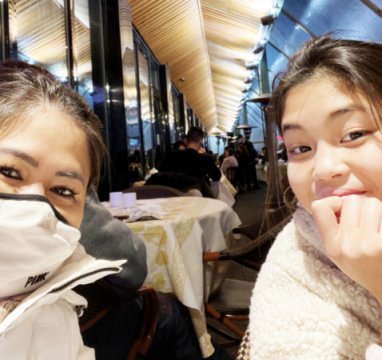
Dining out while observing social distancing, top photo, Melody with husband Dino Dizon, and below photo, with daughter Ashley.


Melody and husband Dino Dizon celehrating New Year’s Eve and welcoming 2021, the COVID Way.
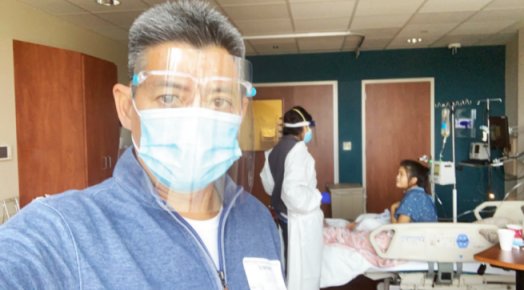
Dino visiting Ashley in the hospital for COVID scare vs pneumonia.
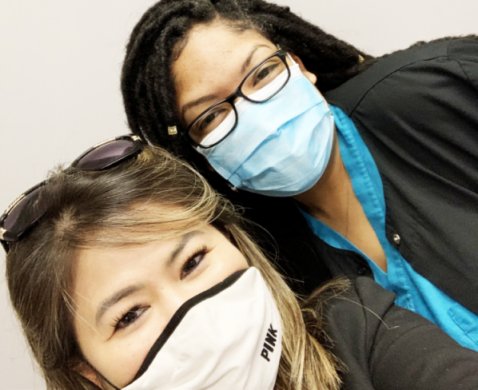
Melody(left) with Liza(right), Office manager of Dr. Gerald Frank
 VIA Times – February 2021 Issue Vital News, Vibrant VIews for Asian Americans in Chicago & Midwest
VIA Times – February 2021 Issue Vital News, Vibrant VIews for Asian Americans in Chicago & Midwest

